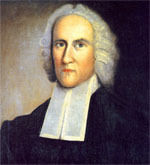In the fall of 1757 Jonathan Edwards, the pastor-theologian-teacher, was asked to assume the presidency of the College of New Jersey, now Princeton University. A few short months later, on March 22, 1758, he passed away. It seemed an untimely tragedy for man whose ministry and work could have been hugely influential at Princeton. George Marsden wrote some insightful words following the death of Jonathan Edwards: “Edwards spent his whole life preparing to die. That isn’t to say Edwards was an escapist, shirking earthly responsibilities for the sake of a heavenly ecstasy. It simply means he labored to redeem every minute of every day for the glory of his Lord and Savior and to ready his own soul for standing in his presence” (Jonathan Edwards: A Life, 490).
No matter what stage of life you’re in, I pray that this series is a helpful and hopeful reminder of how we can be Redeeming Every Minute for the glory of our Lord and Savior.
Do you feel it? I feel it. On my one-year work anniversary I definitely felt it. A seismic shift had occurred in my heart and it happened without thought. It wasn’t my intention for this to happen, but in one short year my priorities had shifted and were no longer focused on ministry and evangelism, or studying God’s word and equipping his church. As I took inventory of my heart I realized it had become more about work and furthering my secular career. For an entire year, I had lost the little daily battles in my thoughts and gave in to the tiny shifts in my heart––and a year of that had created an enormous change in my thoughts and therefore my actions.
In an honest assessment of myself I had begun to worry about work and finances, and I stressed out about my career path more than ever. My stress and anxiety had contributed to distrust in God and a lack of faith in my daily life. How could I have let this happen? I was moving along smoothly in my Christian walk, working faithfully, and all of a sudden I’ve built this idol of work up in my heart. Being successful at work was more important to me than cultivating my relationship with Christ; I was willing to put in long hours to finish projects but unwilling to spend a mere 10 minutes a night on my knees in prayer. What happened to me? Better yet, what went wrong? I began to wonder.
That’s when I realized that I had been fooled by the subtle, persuasive allure of the world in the day-to-day, seemingly harmless temptations in life. I had succumbed to the idea that I could compromise my devotional times here and there, put off my prayer life for a period of time, or neglect fellowship with the church regularly and not be affected at all. Missing a day of prayer wasn’t a big deal, but it made it that much easier to accept missing a week, then two weeks, then an entire month. The slippery slope was real, and I was in a free fall.
I soon realized that this was precisely what Jonathan Edwards was talking about when he committed to labor to redeem everyminute of every day for the glory of God. He didn’t say every month, or every other week, or even every week. Redeem every minute. If he had known the busy-ness of our society today, he might have revised it: Redeem every second. Every thought. As Christians, it’s the subtle thoughts that slowly drag us down.
Edwards undoubtedly had 2 Corinthians 10:5 stored up in his heart when he committed his thoughts to the Lord. There the Apostle Paul writes, “We destroy arguments and every lofty opinion raised against the knowledge of God, and take every thought captive to obey Christ.” Paul was defending his ministry and authority, explaining that his power comes not from the flesh but from the divine power that the Lord has given him to destroy the arguments of the world. He shows that, while Satan has blinded man’s mind (2 Cor. 4:4), the Lord is able to liberate them from evil, idolatrous thoughts in their hearts. The Lord has given every believer divine weapons to take every thought captive to obey Christ.

Why our thoughts? Because that which we think about will inevitably affect our heart, and therefore our worship. Paul understood this and reiterates it to the church at Colosse, “If then you have been raised with Christ, seek the things that are above, where Christ is, seated at the right hand of God. Set your minds on the things that are above, not on things that are on earth. For you have died, and your life is hidden with Christ in God. When Christ who is your life appears, then you also will appear with him in glory” (Col. 3:1-4).
Our daily battle, one that we must and can win by the grace of God, happens between our ears. If we are to set our hearts to worship God, then we must first set our minds to think about God. Here are some ways we can practice this:
1. Store up his Word in your hearts. As we read Scripture, we discover that there is a spiritual battle occurring in our minds each day. What better way to combat worldly thoughts than to replace them with Scripture? Whether it’s memorizing verses every day, or reading and meditating on a single verse throughout the day, thinking about God’s word will focus your heart on eternal things. And even better, it will begin to establish a biblical worldview in your heart as you apply God’s Word to everyday life.
The Greek word for “heart” is kardia, but doesn’t refer to just our feelings and emotions: it refers to our mental process, emotions, and will. God’s word not only convicts our hearts, but helps us to set our minds on the things above.
2. Find accountability at Church. Our mind and hearts are inevitably linked, and the body of Christ is the physical reminder of our Lord to us. Every Christian is called into fellowship for the purpose of encouragement and mutual upbuilding (Rom. 14:19). Brothers and sisters will recognize our needs, help us identify our idols, and refocus our minds on our Savior. Lean on the church because they will point you to Christ.
 Brian Chang serves in Lighthouse’s discipleship ministry. His passion is to help deepen believers’ conviction and understanding of their beliefs. He is grateful for the humble examples displayed by the church family, as well as their patience with his many flaws (especially when it comes to taste in food). In his free time, Brian enjoys reading about church history, writing book reviews, playing basketball, and working on bicycles.
Brian Chang serves in Lighthouse’s discipleship ministry. His passion is to help deepen believers’ conviction and understanding of their beliefs. He is grateful for the humble examples displayed by the church family, as well as their patience with his many flaws (especially when it comes to taste in food). In his free time, Brian enjoys reading about church history, writing book reviews, playing basketball, and working on bicycles.



